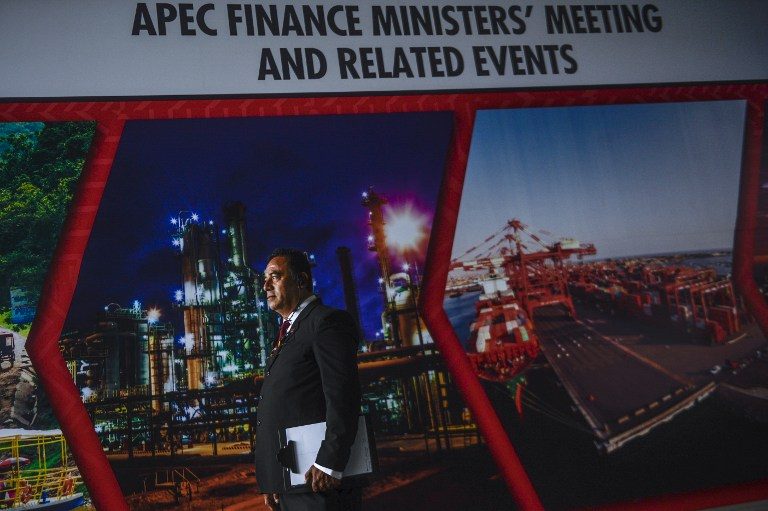SUMMARY
This is AI generated summarization, which may have errors. For context, always refer to the full article.

LIMA, Peru – Top world leaders meet from Thursday, November 17, to try to save their cherished free trade accords from feared extinction under US President-elect Donald Trump.
Here are 3 big factors looming over the 21-nation Asia-Pacific Economic Cooperation summit from Thursday to Sunday (November 17 to 20) in Lima, Peru.
Trump effect
Trump has cast uncertainty on the postwar world order with his vows to curb international free trade to protect US jobs.
This particularly concerns the Asia-Pacific region, which accounts for nearly 60% of the global economy and 40% of the world’s population.
The world will look to the summit for “a strong statement” to counter Trump’s anti-trade arguments, said Eduardo Pedrosa, secretary general of the Pacific Economic Cooperation Council.
Economists expect Trump to make protectionist moves that they say may strengthen his country’s economy in the near term but could threaten the global economy.
He may impose punitive tariffs on powerful trade partners such as China and revise key free trade deals with countries such as Mexico that rely on the US market, the Institute of International Finance said.
“If such measures materialize, trade tensions would certainly increase, with trade war a possible worst case scenario,” it said in a report.
Outgoing US President Barack Obama sought to “rebalance” trade towards deals with Asia and the Pacific.
But Trump has rejected Obama’s signature trade initiative in the Asia-Pacific region, the Trans-Pacific Partnership (TPP), as a “terrible deal.”
Asia-Pacific security
As well as taking aim at free trade, Trump has vowed action on immigration and questioned the US role as the “policeman of the world.”
Allies such as Japan and South Korea are worried Trump will cut back the US military, economic and diplomatic presence in the region.
They fear that could leave them exposed to a dominant China and belligerent North Korea.
Trump has caused concern in the region by suggesting Japan and South Korea get nuclear weapons to defend themselves.
He has embraced Russian President Vladimir Putin, widely mistrusted by Obama and his allies.
Trump has also claimed climate change is a Chinese “hoax” to undermine US manufacturing.
Obama, Putin and China’s President Xi Jingpin are each scheduled to address the summit on Saturday. Japan’s Shinzo Abe is among the other leaders at the summit.
The Latin American leaders in the room, including Mexican President Enrique Pena Nieto, will also be looking nervously to the new US administration.
On the campaign trail, Trump insulted Mexican immigrants as “criminals” and “rapists.” He vowed to build a border wall with Mexico to keep out illegal migrants and threatened mass deportations.
China
China will meanwhile be pushing its own proposed trade deals to gain an edge over the United States in the battle for regional influence.
“The economic landscape in the Asia Pacific is changing rapidly, with China increasingly taking a regional leadership role,” wrote Rajiv Biswas, Asia-Pacific chief economist at research group IHS Global Insight.
“The key strategic challenge for the Trump administration is whether the US will strengthen its engagement with the Asia-Pacific or retreat towards a more isolationist stance,” he said in a note.
China was pointedly excluded from the 12-member TPP. But due to Trump’s refusal to endorse the deal, Biswas said, “the TPP agreement has shifted from being a lame duck to a dead duck.”
Instead China proposes an APEC-wide Free Trade Area of the Asia-Pacific (FTAAP) and a 16-member Regional Comprehensive Economic Partnership (RCEP), which includes India but not the United States.
Trump’s victory “could significantly reshape US economic relations with Asia,” said Biswas. – Rappler.com
Add a comment
How does this make you feel?
There are no comments yet. Add your comment to start the conversation.